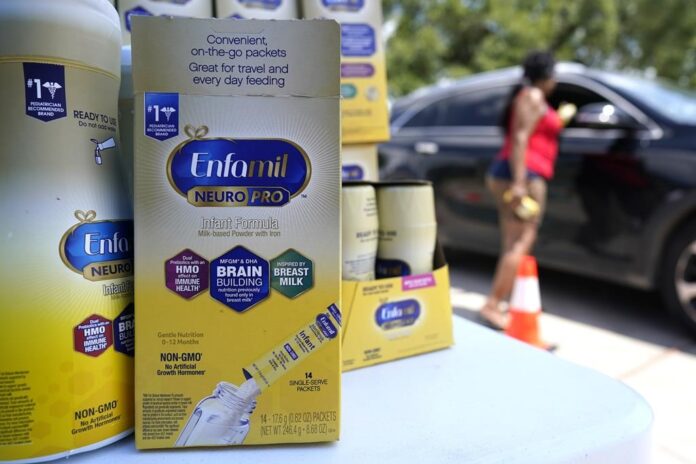The baby formula shortage in the United States continues to affect the Canadian market with many parents taking to social media to try and find the formula needed for their infants and toddlers.
Sylvain Charlebois, director of the agrifood and analytics labs at Dalhousie University in Halifax, told Global News that Canada is not immune to what is happening in the U.S. as Canada relies on its neighbour to the south to import baby formula.
“We actually manufacture baby formula in Canada but all of it goes to China,” he said. “That’s why, right now, parents are scratching their heads (and) wondering why are we short?”
Help on the way from Europe for parents in the U.S. facing baby formula shortage
He said there is some good news, however, as Abbott is set to reopen its plant in Michigan within the next two weeks.
On Feb. 17, the company closed the plant after the Food and Drug Administration found contamination from bacteria.
“If that plant reopens then I think North America should be OK but in the meantime, we’re probably going to expect more formula from Europe,” Charlebois said.
A military plane carrying enough specialty infant formulafor more than half a million baby bottles arrived Sunday in Indianapolis, the first of several flights expected from Europe aimed at relieving a shortage that has sent parents scrambling to find enough to feed their children.
President Joe Biden authorized the use of Air Force planes for the effort, dubbed “Operation Fly Formula,” because no commercial flights were available.
Trending Stories
Texas family sues Apple, claiming loud Amber Alert damaged son’s hearing
U.S. woman arrested after body of 6-year-old son found in trunk
But it appears Canada is still trying to catch up.
There has been some evidence of panic buying and Charlebois said he is not surprised.
“Just seven days ago, the Retail Council of Canada was basically telling Canadians ‘don’t worry about it, don’t worry’. But I didn’t understand that message at all as eventually, it would affect the Canadian market and now I think Canadians are not trusting what people are telling them to do,” he said.
Biden faces criticism abroad as baby formula shortage, inflation create issues ahead of US midterms
Read more:
Canada facing shortage of baby formula for infants with food allergies. Here’s what to do
Charlebois added declining birth rates in the past 20 years have led to the consolidation of only three companies controlling the baby formula market and that is why the closure of just one plant is having such a widespread effect.
Stores have now put limits on the number of formula containers parents and caregivers can buy, but it is still causing many to panic.
Charlebois said supply issues in Canada should get back to normal within about a month if the Michigan plant reopens in less than two weeks.
In a statement to Global News, Health Canada said it is aware of the current global supply constraints and it has published an “interim policy to facilitate the importation of equivalent and safe infant formulas that have been approved by a foreign regulatory authority or are allowed to be sold in foreign jurisdictions that have high quality and manufacturing standards similar to Canada.”
The interim policy applies to specialty infant formula as well as regular infant formula to mitigate the shortage caused by the closure of the plant.
The organization said these products are not normally in the Canadian market but Health Canada does conduct a safety assessment of each product before approving it.
“We understand how this can be concerning to parents and caregivers. Health Canada wants to assure everyone that all products imported to mitigate the shortage and for which CFIA will apply discretionary enforcement are safe,” it said in a statement. “These are from countries that have regulatory and manufacturing standards that are similar to those in Canada. Furthermore, Health Canada has conducted a safety assessment of each product prior to addition to the list.”
— With files from The Associated Press
© 2022 Global News, a division of Corus Entertainment Inc.



